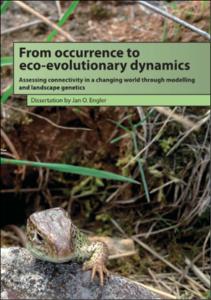Engler, Jan Oliver: From occurrence to eco-evolutionary dynamics : Assessing connectivity in a changing world through modelling and landscape genetics. - Bonn, 2016. - Dissertation, Rheinische Friedrich-Wilhelms-Universität Bonn.
Online-Ausgabe in bonndoc: https://nbn-resolving.org/urn:nbn:de:hbz:5n-43817
Online-Ausgabe in bonndoc: https://nbn-resolving.org/urn:nbn:de:hbz:5n-43817
@phdthesis{handle:20.500.11811/6771,
urn: https://nbn-resolving.org/urn:nbn:de:hbz:5n-43817,
author = {{Jan Oliver Engler}},
title = {From occurrence to eco-evolutionary dynamics : Assessing connectivity in a changing world through modelling and landscape genetics},
school = {Rheinische Friedrich-Wilhelms-Universität Bonn},
year = 2016,
month = jun,
note = {Climate change and the intensification of human land use are generally accepted as leading factors for global biodiversity loss, and their synergistic effects could make species loss even worse. In particular, habitat loss and fragmentation can hamper the exchange among populations or even prevent it, but exchange is needed to counterbalance the effects of range shifting due to climate change. This can lead to negative demographic and genetic effects which can be tremendous for the affected populations.
To counteract these effects, and to develop more efficient conservation efforts, knowledge on population connectivity is mandatory. This thesis aims to contribute to this knowledge by linking tools from different disciplines for their application in conservation planning and spatial ecology. Introduced as potential connectivity models (PCMs) in Chapters 1 and 2, they will cover two main topics of the thesis: environmental planning (Chapters 3 - 5) and landscape genetics (Chapters 6 and 7). After this, the use of genetic information for niche models is highlighted in the final part of the thesis (Chapter 8).},
url = {https://hdl.handle.net/20.500.11811/6771}
}
urn: https://nbn-resolving.org/urn:nbn:de:hbz:5n-43817,
author = {{Jan Oliver Engler}},
title = {From occurrence to eco-evolutionary dynamics : Assessing connectivity in a changing world through modelling and landscape genetics},
school = {Rheinische Friedrich-Wilhelms-Universität Bonn},
year = 2016,
month = jun,
note = {Climate change and the intensification of human land use are generally accepted as leading factors for global biodiversity loss, and their synergistic effects could make species loss even worse. In particular, habitat loss and fragmentation can hamper the exchange among populations or even prevent it, but exchange is needed to counterbalance the effects of range shifting due to climate change. This can lead to negative demographic and genetic effects which can be tremendous for the affected populations.
To counteract these effects, and to develop more efficient conservation efforts, knowledge on population connectivity is mandatory. This thesis aims to contribute to this knowledge by linking tools from different disciplines for their application in conservation planning and spatial ecology. Introduced as potential connectivity models (PCMs) in Chapters 1 and 2, they will cover two main topics of the thesis: environmental planning (Chapters 3 - 5) and landscape genetics (Chapters 6 and 7). After this, the use of genetic information for niche models is highlighted in the final part of the thesis (Chapter 8).},
url = {https://hdl.handle.net/20.500.11811/6771}
}






